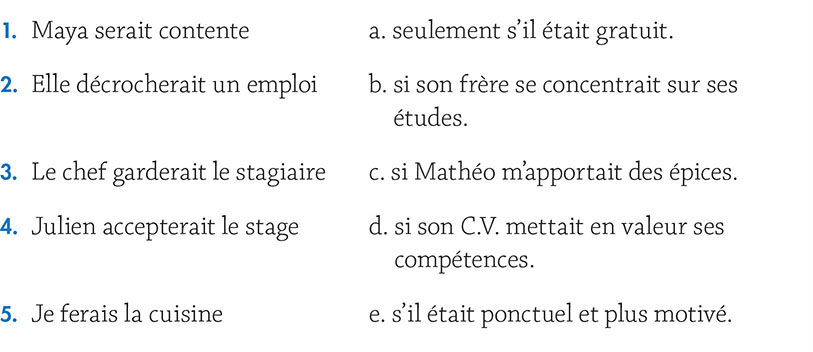12 Thinking About the World in the Conditional Mood
As Gérard Lenorman famously sang, “Si j’étais président de la République, j’écrirais mes discours en vers et en musique.” If you could be president for a day, what would you do? The conditional mood allows us to express hypothetical statements and things we would like to change about the past.
The Conditionnel Présent
The conditionnel présent (present conditional) is a mood referring to hypothetical events that are not guaranteed to occur, and are often dependent on certain conditions. In many instances, it is used in si clauses, but it has many uses we’ll explore in this chapter. It is formed by adding the endings of the imperfect to the future stem of a verb.

As we saw in Chapter 10, some verbs have an irregular stem in the future:


■ The conditionnel présent is used to express a wish or a suggestion.

■ The conditionnel présent is used to make a statement or a request more polite.

■ The conditionnel présent is used when a condition is implied. In most cases, when the main clause is in the conditionnel présent, the si clause is in the imparfait. (If you need to, review the imparfait in Chapter 11.)
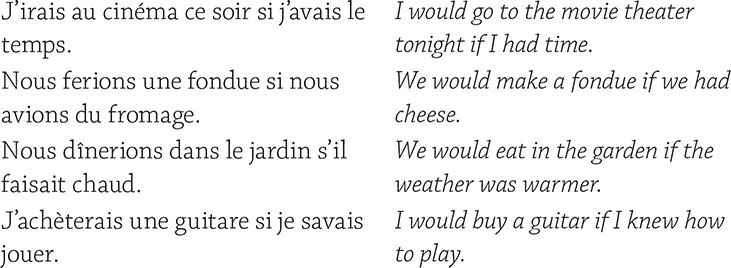
■ When au cas où (in case) implies a hypothetical fact, the conditional is used.

■ The conditionnel présent is also used in idiomatic expressions such as:
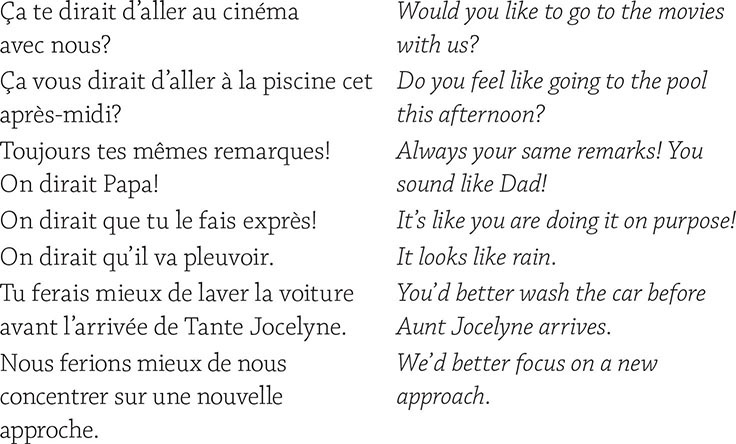

■ The conditional mode is also used to express unconfirmed or alleged information. In this case it is called the conditionnel journalistique, most useful when reading the press or listening to the news. It is translated in English by “reportedly” or “allegedly.”
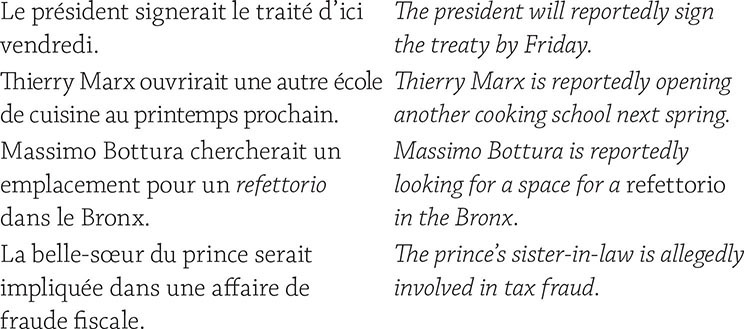
More examples of the conditionnel journalistique will be featured in the conditionnel passé section.
The Conditionnel Passé
The conditionnel passé (past conditional) expresses what would have happened if another event had taken place or if certain conditions had not been present. It is formed with the present conditional of être or avoir and the past participle of the main verb. The rules of agreement common to all compound tenses still apply.


■ The conditionnel passé can express regret or reproach.
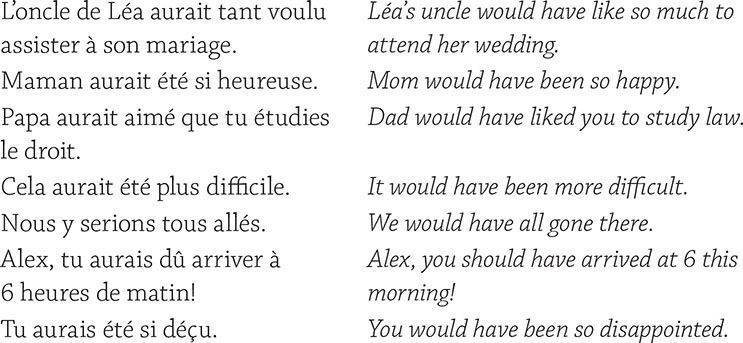
■ The conditionnel passé is often found with a si clause in the plus-que-parfait. (For a review of the plus-que-parfait, see Chapter 11.)
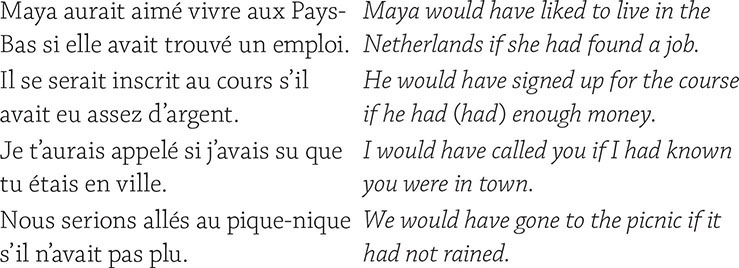
■ The conditionnel passé is also used like the conditionnel présent as conditionnel journalistique to make a statement not confirmed by authorities. In most cases with “allegedly” or “reportedly,” the conditional will be used.
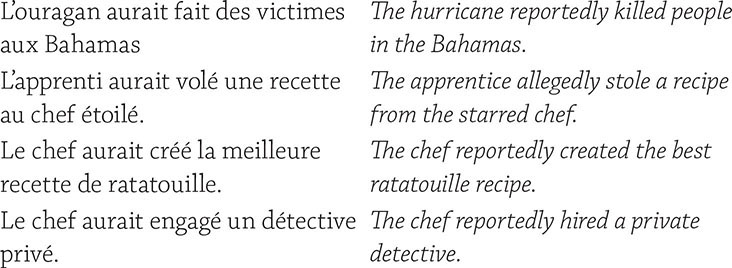
The Verb Devoir in the Conditional
We have encountered “could” and “would” in the examples at the beginning of the chapter. Let’s first refresh our memory before looking at “should” a little closer.
When “could” refers to a hypothesis, a suggestion, the conditionnel présent of pouvoir is used.

When “would” refers to a polite request, the conditionnel is used. Note the following examples:

As we studied in Chapter 11, when “would” refers to a repeated action in the past, the imparfait is used.

When “should” means “ought to,” the conditionnel présent or the conditionnel passé of the verb devoir is used. Like in English, it is followed by the infinitive.
First, let’s conjugate devoir in the present and past conditional.



 DIALOGUE Qu’est-ce que tu veux faire dans la vie? What do you want to do with your life?
DIALOGUE Qu’est-ce que tu veux faire dans la vie? What do you want to do with your life?
Maya is talking to her younger brother Aurélien about his plans for the future. While Maya is more pragmatic, Aurélien dreams of a world where everything would be perfectly to his liking.






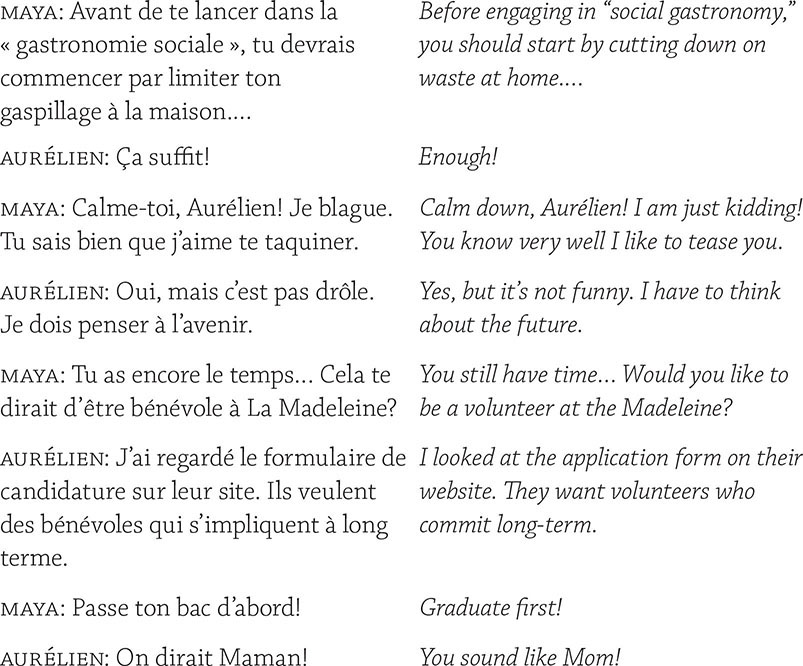



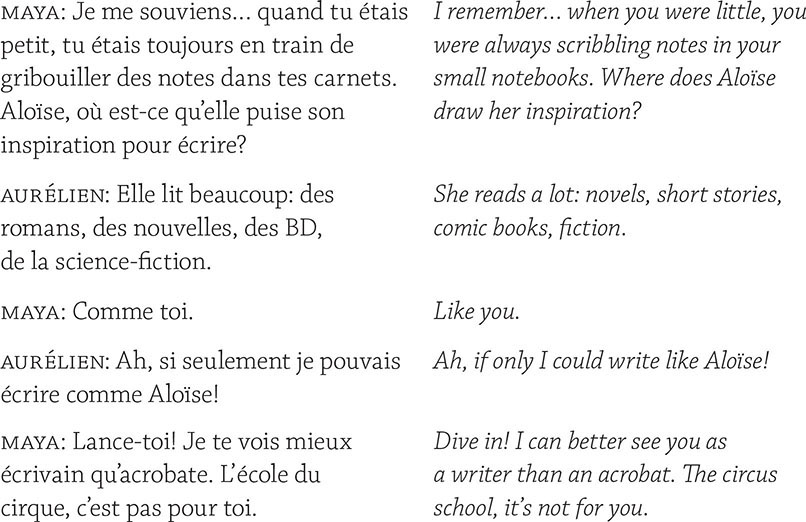
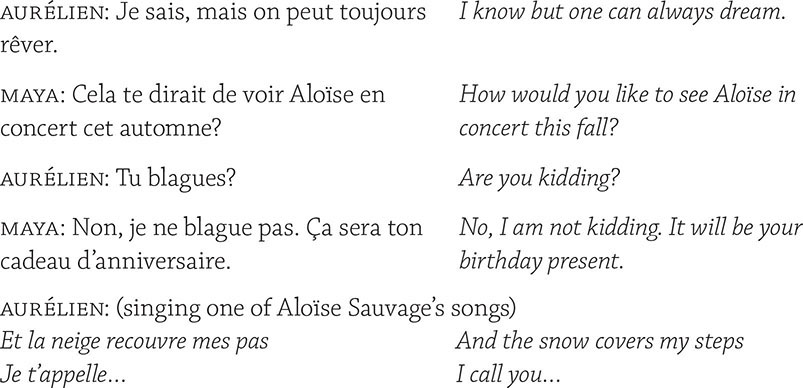
EXERCISES
EXERCISE 12.1
Conjugate the following verbs in the conditionnel présent.
1. dire (je) ___________
2. voyager (elle) ___________
3. aller (nous) ___________
4. prendre (je) ___________
5. savoir (elles) ___________
6. avoir (tu) ___________
7. répondre (ils) ___________
8. devoir (nous) ___________
9. commander (il) ___________
10. accepter (vous) ___________
EXERCISE 12.2
Conjugate the following verbs in the conditionnel présent and the imparfait.
1. Est-ce que tu (dîner) ___________ avec nous si tu (être) ___________ disponible?
2. Je (chanter) ___________ une chanson si tu me le (demander) ___________ .
3. Nous (voyager) ___________ davantage si nous (avoir) ___________ plus de temps.
4. Il (s’inscrire) ___________ à un cours de cuisine s’il (vouloir) ___________ devenir cuisinier.
5. Mamie (être) ___________ contente si tu (venir) ___________ la voir.
6. Nous (aller) ___________ en Normandie si nous (pouvoir) ___________ peindre en plein air.
7. Aurélien (se lancer) ___________ dans la gastronomie sociale s’il (avoir) ___________ un sponsor.
8. Je (emporter) ___________ deux valises si je (faire) ___________ une croisière.
9. Elle (numériser) ___________ les photos si elle (être) ___________ à Menton.
10. Vous (organiser) ___________ votre vie autrement si vous le (pouvoir) ___________ .
EXERCISE 12.3
Translate the following sentences using vous when necessary.
1. We would go to France if we had the time.
2. She would buy a bicycle if she lived in Normandy.
3. Could you tell me at what time the class starts?
4. I would cook tonight if you brought some cheese.
5. He would be happy if the chef offered him an internship.
6. They would visit the school if you could show it to them.
7. We would go to the beach if there were fewer people.
8. You’d better study tonight!
9. We’d better listen to Maya’s advice.
10. He would play the guitar if his sister bought him one.
11. I would launch an app if you helped me.
12. I would take care of it in case there is a problem.
13. Do you feel like going to the Picasso Museum?
14. It would be better not to reveal his secret.
15. We would take a walk if it was not raining.
EXERCISE 12.4
Match the items in the two columns. Choose the most logical answers.
EXERCISE 12.5
Conjugate the following verbs in the conditionnel passé and the plus-que-parfait.
1. Elle (acheter) ___________ des lunettes Vuarnet si elle en (trouver) ___________.
2. Ils (lancer) ___________ une app s’ils (réunir) ___________ assez d’argent.
3. Vous (regarder) ___________ le film si vous (arriver) ___________ plus tôt.
4. Ils (décrocher) ___________ leur bac avec mention s’ils (étudier) ___________ plus sérieusement.
5. Tu (travailler) ___________ dans l’hôtellerie si tu (pouvoir) ___________.
6. La cheffe (faire) ___________ une bouillabaisse si nous (être) ___________ au moins quatre.
7. Je (changer) ___________ l’ampoule si j’en (trouver) ___________ une.
8. Elle (s’inscrire) ___________ au cours de danse si son emploi du temps (être) ___________ moins chargé.
9. Vous (arriver) ___________ à l’heure s’il (ne pas y avoir) ___________ un accident sur l’autoroute.
10. Je (acheter) ___________ un nouveau sac à dos si je le (perdre) ___________ dans le RER.
EXERCISE 12.6
Translate the following sentences using the tu form.
1. He would have sold his restaurant if he had lost one star.
2. You would have made a film on the chef if he had given you permission.
3. She would have gone on vacation if she had saved enough money.
4. They would have bought a house in Brittany if their brother had been able to help them.
5. I would have signed up for the Japanese course if you had signed up with me.
6. Julie would have gone to the concert with them if she had finished her project in time.
7. He would have sent the form if he had been sure to be accepted.
8. I would have sent you some flowers if I had known it was your birthday.
9. She would have bought your car if you had asked a reasonable price.
10. I would not have made so many mistakes if I had reviewed the conditional.
EXERCISE 12.7
Conjuguate the verbs in the past conditional to convey the idea that an event might have occurred, using thus the conditionnel journalistique.
1. La cheffe (créer) ___________ une recette pour faire le soufflé basque au fromage de brebis.
2. Julia (envoyer) ___________ le formulaire d’inscription à l’école de danse.
3. La chanteuse (improviser) ___________ une nouvelle chanson à l’Espace culturel André Malraux.
4. L’agent (proposer) ___________ un contrat de 500 000 euros au scénariste.
5. Les diplomates (revenir) ___________ de mission en hélicoptère vers deux heures du matin.
6. La directrice de communication (démissionner) ___________ suite à un désaccord.
7. Il (enregistrer) ___________ son nouveau disque dans un studio à Berlin.
8. Le cyclone (détruire) ___________ des centaines d’habitations.
9. Le président (signer) ___________ un traité avec l’Allemagne.
10. La police (retrouver) ___________ les lingots d’or volés dans le coffre-fort de la banque.
EXERCISE 12.8
Translate the following sentences using the conditionnel journalistique, present or past. Proceed carefully!
1. The French Minister of Education reportedly promised big changes.
2. The private detective reportedly found the palace’s cat stolen by a neighbor.
3. The photographer reportedly retouched the picture of Lily-Rose, Chanel’s model.
4. The thief allegedly sold my bike to a policeman.
5. The cyclone reportedly killed five people.
6. The scientist will reportedly announce the results of his research this weekend.
7. Aloïse Sauvage reportedly recorded her new song in a swimming pool.
8. Juliette and Vincent will reportedly get married in Iceland, far away from the journalists.
9. The young cook reportedly changed the chef’s recipe!
10. Princess Victoria of Sweden will reportedly visit the first lady of France.
EXERCISE 12.9
Translate the following sentences into English.
1. Nous aimerions vous inviter à déjeuner.
2. Vous devriez organiser un voyage en Bourgogne.
3. Elle se serait inscrite au cours de yoga si elle avait eu du temps libre.
4. Tu devrais te dépêcher. On va être en retard.
5. Je serais allée à Amsterdam si tu avais pu m’y rejoindre.
6. Qu’est-ce que tu ferais si tu gagnais un million d’euros au loto?
7. Il aurait fait une paëlla aux crevettes si elles avaient eu faim.
8. Le président aurait refait le décor de son bureau.
9. J’aurais aimé avoir un appartement dans le 15e arrondissement.
10. Il devrait inviter tous les employés à la réception.
EXERCISE 12.10
Translate the following sentences using the vous form when necessary.
1. We should open a restaurant in the 18th arrondissement.
2. She will reportedly sing for the French president’s birthday.
3. You should learn how to play the piano.
4. An admirer allegedly entered the queen’s palace.
5. I would like to meet the volunteers at the Madeleine Church.
6. I would attend his conference if I could get a ticket.
7. Could you make a spinach quiche?
8. I should have read one of Flaubert’s novels.
9. Don’t you think they should have called us?
10. They should try not to waste food.

LE COIN DES CRÉATEURS
Écrire cinq petits paragraphes en expliquant ce que vous feriez face à une situation inattendue. La proposition si est à l’imparfait; la proposition principale est au conditionnel.
Si je rencontrais Massimo Bottura, je lui demanderais de m’engager.
Si j’étais un objet, je serais un secrétaire Empire en acajou.
À votre tour!
Si je gagnais à la loterie…
Si je trouvais un chaton dans la rue…
Si mes parents…
Si ma sœur…
Si j’étais un oiseau…
Si je décrochais un stage…
Si…
NOTE CULTURELLE
LE CENTRE NATIONAL DES ARTS DU CIRQUE – THE NATIONAL CENTER FOR CIRCUS ARTS
If you plan to run off and join the circus, be sure to get your degree first!
Since the previous century, when “running off to join the circus” was often a reality, the idea has become a euphemism for leaving one’s present life to seek adventure, excitement, and, perhaps, a bit of danger. Today’s circus performers are no longer runaways! They are genuine artists, and like musicians, actors, dancers, and other performing artists, they devote a great deal of time to study and training. This was formerly done mostly through apprenticeship, but it is now possible to perfect one’s craft academically, and France has been in the forefront of enabling aspiring circus artists to do so.
The French National Center for Circus Arts (Centre National des Arts du Cirque, CNAC) is an institution of higher education and research that was created in 1985 by the French Ministry of Culture as a way of “making a positive contribution to the renewal of circus arts and contemporary creation.” It was given three primary missions: 1) to provide higher education in the circus arts, 2) to offer lifelong learning opportunities, and 3) to serve as a research and resource center. The CNAC very quickly incorporated its teaching project into the “nouveau cirque” (“new circus”) movement, and the training it provides is of an uncompromisingly high standard with regard to technical learning and command of the vocabulary specific to each circus discipline.
The CNAC is located in the city of Châlons-en-Champagne, chosen, in part, for its beautiful concrete circus building, designed by architect Louis Gillet and built in 1898–1899. Since its inception, it has given students interested in circus arts and performance the opportunity to earn a university-level degree. In 2014, it combined its courses with the National School of Circus Arts (ENACR) and the University of Picardie Jules Verne (UPJV). Students do an optional preparatory year and their first year of study at the ENACR and their second and third years at CNAC. They also have a parallel registration at the UPJV. Admission is by application and requires a video, 7 minutes maximum, of the applicant performing with his/her apparatus. The course of study combines specialist training mainly with group classes in dance, drama, and general knowledge, as well as artistic research workshops. Some specific courses include acrobatic dance, aerial and floor acrobatics, clowning, tightrope, trampoline, trapeze, and unicycle. Upon successfully completing the program, students are awarded the Higher National Vocational Diploma for Circus Artists (DNSP-AC). There is a very high placement rate for graduates, who go on to perform in circuses throughout France, Europe, and the rest of the world.
For those who have already graduated and are working professionally, the CNAC also offers lifelong learning. Skills already acquired, not only by performers but also by circus technicians and administrators, can be maintained and new ones developed. Continuing education is available for teachers, along with the opportunity to earn the French State Diploma for Circus Teachers. Artistic and cultural education courses are also offered for those working outside the circus environment, such as designing and organizing cultural outreach circus projects.
The circus is international, so foreign students can apply, but some knowledge of French is required since it is the official language of instruction.
 KNOW
KNOW Using the conditional tense can help soften requests.
Using the conditional tense can help soften requests.

